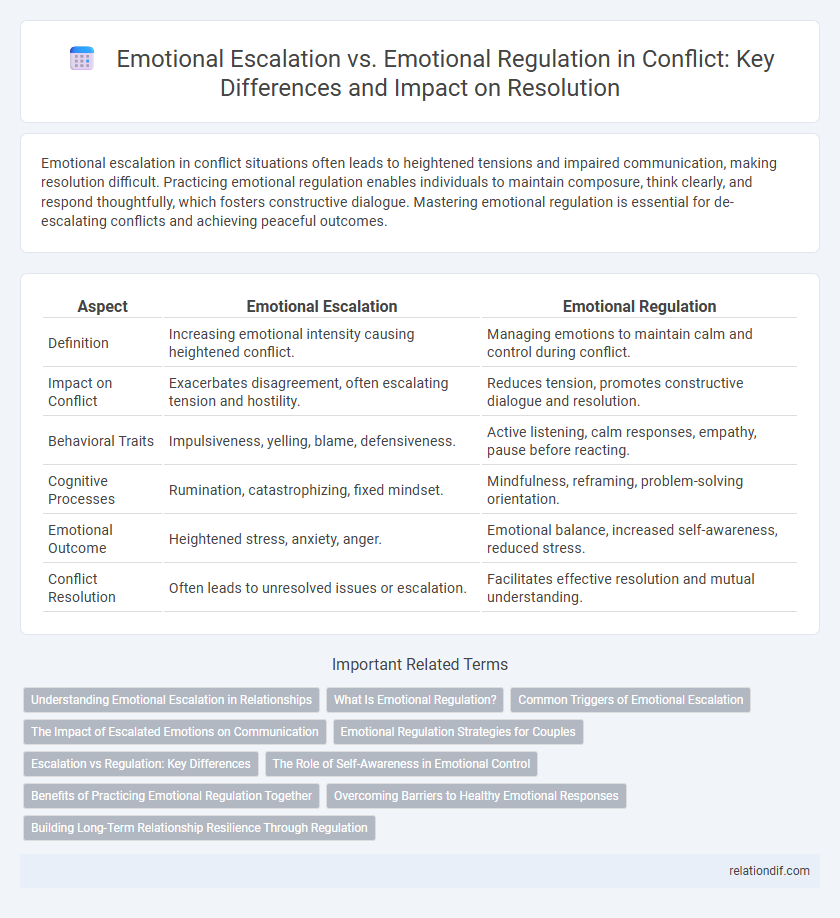Emotional escalation in conflict situations often leads to heightened tensions and impaired communication, making resolution difficult. Practicing emotional regulation enables individuals to maintain composure, think clearly, and respond thoughtfully, which fosters constructive dialogue. Mastering emotional regulation is essential for de-escalating conflicts and achieving peaceful outcomes.
Table of Comparison
| Aspect | Emotional Escalation | Emotional Regulation |
|---|---|---|
| Definition | Increasing emotional intensity causing heightened conflict. | Managing emotions to maintain calm and control during conflict. |
| Impact on Conflict | Exacerbates disagreement, often escalating tension and hostility. | Reduces tension, promotes constructive dialogue and resolution. |
| Behavioral Traits | Impulsiveness, yelling, blame, defensiveness. | Active listening, calm responses, empathy, pause before reacting. |
| Cognitive Processes | Rumination, catastrophizing, fixed mindset. | Mindfulness, reframing, problem-solving orientation. |
| Emotional Outcome | Heightened stress, anxiety, anger. | Emotional balance, increased self-awareness, reduced stress. |
| Conflict Resolution | Often leads to unresolved issues or escalation. | Facilitates effective resolution and mutual understanding. |
Understanding Emotional Escalation in Relationships
Emotional escalation in relationships occurs when negative feelings amplify, leading to heightened tension and intensified conflict responses. Recognizing patterns such as increasing defensiveness, raised voices, or personal attacks is essential for identifying escalation early. Effective emotional regulation strategies, including mindfulness and active listening, help de-escalate conflicts and foster healthier communication dynamics.
What Is Emotional Regulation?
Emotional regulation refers to the ability to effectively manage and respond to an emotional experience by controlling the intensity, duration, and expression of emotions. It involves strategies such as cognitive reappraisal and mindfulness to reduce emotional escalation and promote constructive conflict resolution. Developing emotional regulation skills helps individuals maintain composure, improve interpersonal communication, and prevent conflicts from intensifying.
Common Triggers of Emotional Escalation
Common triggers of emotional escalation in conflicts include perceived threats, misunderstandings, and unmet expectations. Sensory overload, such as loud noises or aggressive body language, can also intensify emotional responses. Recognizing these triggers enables effective emotional regulation strategies, reducing the risk of prolonged disputes.
The Impact of Escalated Emotions on Communication
Escalated emotions during conflict intensify misunderstandings and hinder effective communication by triggering defensive responses and reducing active listening. Heightened emotional states activate the brain's amygdala, impairing rational thought and amplifying negative interpretations of others' messages. Emotional regulation techniques, such as mindfulness and cognitive reframing, are essential to maintaining clarity and fostering productive dialogue.
Emotional Regulation Strategies for Couples
Emotional regulation strategies for couples include active listening, expressing feelings without blame, and practicing mindfulness to reduce emotional escalation during conflicts. Techniques such as deep breathing, taking timeouts, and using "I" statements help partners manage intense emotions and foster constructive communication. Consistent application of these strategies enhances empathy, strengthens emotional bonds, and promotes long-term relationship stability.
Escalation vs Regulation: Key Differences
Emotional escalation in conflict involves a surge of intense feelings like anger or frustration, leading to reactive behaviors that intensify disputes and hinder resolution. Emotional regulation, by contrast, entails managing and modulating these emotions to maintain control, fostering calm communication and constructive problem-solving. Key differences lie in escalation prompting impulsive reactions that exacerbate conflicts, whereas regulation supports thoughtful responses that de-escalate tension and promote mutual understanding.
The Role of Self-Awareness in Emotional Control
Self-awareness serves as a crucial element in emotional regulation during conflicts by enabling individuals to recognize and understand their emotions before reacting impulsively. Heightened self-awareness allows for intentional responses rather than automatic escalation, reducing the intensity of negative emotions such as anger or frustration. Research indicates that individuals with strong self-awareness skills exhibit better emotional control, leading to more constructive conflict resolution outcomes.
Benefits of Practicing Emotional Regulation Together
Practicing emotional regulation together significantly reduces the intensity of emotional escalation during conflicts, fostering a calmer and more constructive dialogue. Shared regulation techniques enhance mutual understanding and empathy, leading to quicker resolutions and stronger relational bonds. Couples and teams that engage in collective emotional management experience lower stress levels and improved long-term communication outcomes.
Overcoming Barriers to Healthy Emotional Responses
Emotional escalation often arises from unaddressed triggers and misinterpretations that amplify conflict intensity, hindering resolution efforts. Developing emotional regulation through mindfulness techniques and cognitive reframing reduces reactive behaviors, fostering constructive dialogue. Overcoming barriers to healthy emotional responses requires consistent practice in self-awareness, empathetic listening, and stress management strategies to maintain emotional balance during conflicts.
Building Long-Term Relationship Resilience Through Regulation
Effective emotional regulation during conflicts contributes significantly to building long-term relationship resilience by minimizing destructive outbursts and promoting constructive communication. Mastery of self-regulation techniques enables partners to navigate disagreements calmly, preserving trust and fostering mutual understanding. Consistent practice of emotional regulation strengthens relational bonds and enhances the capacity to resolve future conflicts healthily.
emotional escalation vs emotional regulation Infographic

 relationdif.com
relationdif.com